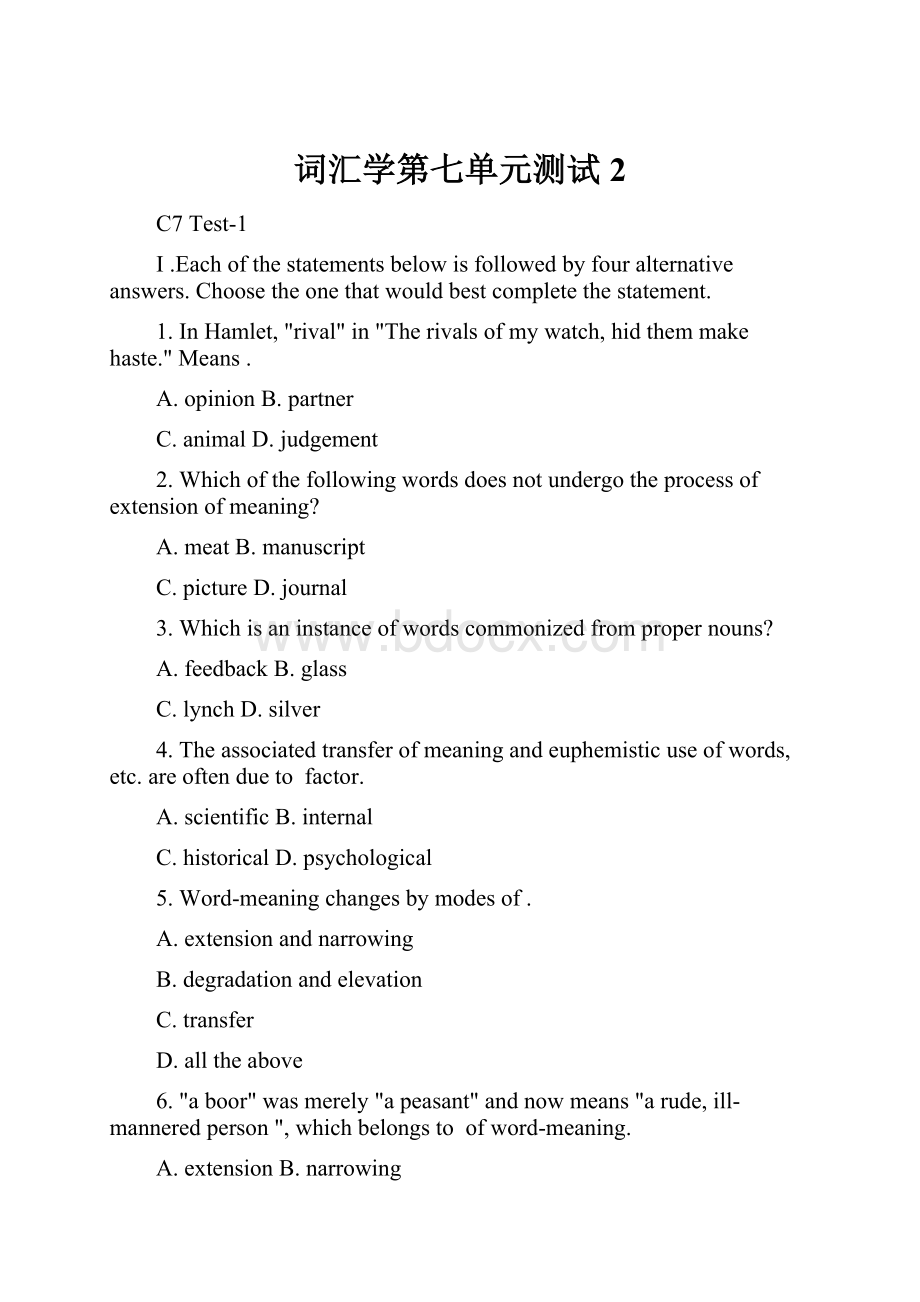 词汇学第七单元测试2.docx
词汇学第七单元测试2.docx
- 文档编号:27742548
- 上传时间:2023-07-04
- 格式:DOCX
- 页数:19
- 大小:22.27KB
词汇学第七单元测试2.docx
《词汇学第七单元测试2.docx》由会员分享,可在线阅读,更多相关《词汇学第七单元测试2.docx(19页珍藏版)》请在冰豆网上搜索。

词汇学第七单元测试2
C7Test-1
I.Eachofthestatementsbelowisfollowedbyfouralternativeanswers.Choosetheonethatwouldbestcompletethestatement.
1.InHamlet,"rival"in"Therivalsofmywatch,hidthemmakehaste."Means.
A.opinionB.partner
C.animalD.judgement
2.Whichofthefollowingwordsdoesnotundergotheprocessofextensionofmeaning?
A.meatB.manuscript
C.pictureD.journal
3.Whichisaninstanceofwordscommonizedfrompropernouns?
A.feedbackB.glass
C.lynchD.silver
4.Theassociatedtransferofmeaningandeuphemisticuseofwords,etc.areoftenduetofactor.
A.scientificB.internal
C.historicalD.psychological
5.Word-meaningchangesbymodesof.
A.extensionandnarrowing
B.degradationandelevation
C.transfer
D.alltheabove
6."aboor"wasmerely"apeasant"andnowmeans"arude,ill-manneredperson",whichbelongstoofword-meaning.
A.extensionB.narrowing
C.elevationD.degradation
7.Theoriginalmeaningof"shrewd"is"evil"or"wickedness"whilemodemmeaningis"clever".Thisisofword-meaning.
A.extensionB.elevation
C.degradationD.transfer
8.Themeaningsof"lip"and"tongue"in"thelipofawound"and"thetongueofabell"haveexperienced.
A.extensionB.elevation
C.associatedtransferD.degradation
9.isnotthenarrowingofword-meaning.
A.Somephrasesareshortenedandonlyoneelementoftheoriginalislefttoretainthemeaningofthewhole
B.Materialnounsareusedtorefertoobjectsmadeofthem
C.Awordofabstractmeaningisusedasaconcretemeaning
D.Acommonwordisturnedintoaspecificword
10."silly"meant"happy"inoldEnglish,butnowitmeans"foolish".Thiscodeofword-meaningchangeis.
A.elevationB.narrowing
C.transferD.degradation
11."paper"in"awhitepaper"means.
A.newspaper
B.asetofquestionsusedasanexam
C.governmentdocument
D.essaywrittenattheendoftheterm
12."do"in"doamuseum"means“”.
A.arrangeB.study
C.cleanD.visit
13.haveexperiencedtheextensionofmeanings.
A.Propernounsinthepast
B.PolysemicwordsofmodemEnglish
C.Technicaltermsinthepast
D.Alltheabove
14.Theoriginalmeaningof"nice"is"ignorant"or"foolish"anditsmodemmeaningis"delightful".Thisisofwordmeaning.
A.transferB.degradation
C.elevationD.extension
15.DuringAmericanCivilWar,theword"copperhead",avenomoussnakeintheSouthofAmerica,wasendowedwiththenewmeaningthenorthernerswhoweresecretlyaidingandabettingthesouthbecauseof.
A.historicalreasonB.classreason
C.religiousreasonD.psychologicalreason
16.Linguisticfactorsofwordmeaningchangeexclude.
A.internalfactorswithinthelanguagesystem
B.theinfluxofborrowing
C.analogy
D.grammar
17.Inradiation,thesecondarymeaningofawordisderivedfromtheprimarymeaningofawordby.
A.extensionB.specialization
C.transferD.alltheabove
18.Ofthemodes'ofword-meaningchanges,arethemostcommon.
A.degradationandtransfer
B.extensionandnarrowing
C.elevationandtransfer
D.narrowinganddegradation
19.Alegalterm“alibi”signifying“pleathattheaccusedisnotattheplacewhenthecrimeiscommitted”nowmeans“excuse.”Thischangeofword-meaningiscalled
A.extensionB.narrowing
C.degradationD.transfer
20.“minister”originallymeant“servant”.Thisprocessofmeaningshiftiscalled
A.extensionB.narrowing
C.elevationD.transfer
21.“hope”hastransferredfromto.
A.concrete,abstract
B.abstract,concrete
C.appreciative,pejorative
D.pejorative,appreciative
22.isthemostunstableelementofalanguage.
A.PronunciationB.Meaning
C.VocabularyD.Grammar
23.Somemeaningsremainmuchthesameforatime,butoften,a/anformorgroupofformsarepressedintonewservicewhenanewlinguisticneedisfelt.
A.newB.archaic
C.oldD.obsolete
24.InHamlet,“pregnant”in“Howpregnantsometimeshisrepliesare.”means
A.foolishB.clever
C.withchildD.meaningful
25.Extensionisfoundin.
A.polysemicwords
B.technicalterms
C.commonizedpropernouns
D.alltheabove
26.Ifawordwhichusedtohaveamoresensebecomesrestrictedinitsapplicationinapresent-daylanguage,thewordhasundergonenarrowingofmeaning.
A.specificB.pejorative
C.generalD.appreciative
27.Pejorationisaprocesswherebywordsofgoodoriginfallsintoreputationorwordscometobeusedinsense.
A.bad,good,derogatory
B.neutral,good,derogatory
C.ill,iii,commendatory
D.iii,non-affective,derogatory
28.Ifawordhasextendedtocoveraandoftendefiniteconcept,thewordhasundergoneextensionofmeaning.
A.broader,moreB.narrower,less
C.broader,lessD.narrower,more
29.Whichofthefollowingwords'hasnotundergonedegradationofmeaning?
A.wench.B,-hussy
C.angelD.boor
30.Whichofthefollowingwordshasundergoneextensionofmeaning?
A.sillyB.knave
C.lewdD.mill
31.Transferexcludes.
A.associatedtransfer
B.transferofsensations
C.transferbetweensubjectiveandobjectivemeanings
D.transferredepithet
32.Whichofthefollowingwordshasnotundergonenarrowingofmeaning?
A.liquorB.poison
C.journalD.garage
33.Thecausesofmeaningchangeinlinguisticaspectsinclude.
A.internalfactorswithinthelanguagesystem
B.theinfluxofborrowings
C.analogy
D.alltheabove
34.Theattitudeofclasseshasalsomadeinroadsintolexicalmeaninginthecaseofor.
A.extension,narrowingB.elevation,degradation
C.extension,transferD.elevation,transfer
35.Quiteanumberofwordsthatdenotedifferentsortsofpeopleortheiroccupationshaveacquiredsenses.
A.rich,non-affectiveB.working,appreciative
C.rich,pejorativeD.working,pejorative
36.Theandareoftenduetopsychologicalfactors.
A.associatedtransfer,figurativeuseofwords
B.transferofsensations,euphemisticuseofwords
C.transferbetweensubjectiveandobjectivemeanings,transferbetweenabstractandconcretemeanings.
D.associatedtransfer,euphemisticuseofwords
37."angel","martyr"and"paradise"havetheirmeaningselevatedtomeet.
A.psychologicalneedB.socialneed
C.economicneedD.religiousneed
38.Meaningchangeinlinguisticaspectisdueto.
A.internalfactorswithinthelanguagesystem
B.theinfluxofborrowings
C.analogy
D.alltheabove
39.Manylow,humbleanddespisedoccupationstakemorenamesdueto
reasons.
A.appealing,economic
B.vulgar,psychological
C.appealing,psychological
D.non-affecting,psychological
40.Whichofthefollowingwordshasnotundergoneelevationofmeaning?
A.earlB.governor
C.fondD.fabulous
II.Completethefollowingstatementswithproperwordsorexpressionsaccordingtothecoursebook.
1.Extensionofmeaning,alsoknownas,isthenamegiventothewideningofmeaningwhichsomewordsundergo.
2.Themostcommontypesofword-meaningchangesareextensionand.
3.Narrowingofmeaningistheoppositeofmeaning.
4.Theassociatedtransferofmeaningandeuphemisticuseofwordsetc.areoftendueto.
5.Extensionofmeaningisalsoknownas.
6.isthenamegiventothewideningofmeaningwhichsomewordsundergo.
7.Extensionisaprocessbywhichawordwhichoriginallyhadameaninghasnowbecomegeneralized.
8.Narrowingofmeaningisalsocalled.
9.istheoppositeofwideningmeaning.
10.Elevationisalsoknowas.
1l.referstotheprocessbywhichwordsrisefromhumblebeginningtopositionsofimportance.
12.Degradationisalsocalled.
13.Pejorationofmeaningistheoppositeofsemantic.
14.Wordswhichwereusedtodesignateonethingbutlaterchangedtomeansomethingelsehaveexperiencedtheprocessofsemantic.
15."glass"for"cup"isaninstanceof.
16.Theword"pen"originallymeant“”.
17.Theword"atom"isderivedfromtheform"atom”.
18.Thechangeofmeaningmaybecausedbyfactorswithinthelanguagesystem.
19."animal"isawordfrom.
20."beast"isawordfrom.
21.Comparatively,thecontentisevenmoreunstablethanthe.
22.AlargenumberofwordsofmodemEnglishhavetheirmeaningsextendedsometimeinthecourseofdevelopment.
23.Extensionofmeaningisalsofoundinmanyterms,whichasthetermsuggestsareconfinedtospecializeduse.
24.Wordsfrompropernounshaveexperiencedextensionofmeaning.
25.Extensionisaprocessbywhichawordwhichoriginallyhadaspecializedmeaninghasnowbecome.
26.Ifawordhasundergonenarrowingofmeaning,thewordconveysameaninginapresent-daylanguage.
27.Thetwokindsofpejorationare
(1)wordsofgoodoriginfallintoiiireputationand
(2)non-affectivewordscometobeusedinsense.
28.Transferincludesassociatedtransfer,transferbetweensubjectiveandobjectivemeanings,transferfromabstracttoconcretemeaningsandtransferof
29.Thetwomajorfactorsthatcausechangesinmeaningconsistoflinguisticfactorsandfactors.
30.Itoftenhappensthatawordisretainedforanamethoughthemeaninghaschangedbecausethehaschanged.
31.Manywordsaboutpeopleortheirprofessionshaveacquiredpejorativesenses.
32.Theassociatedtransferofmeaninganduseofwords,etc.areoftenduetopsychologicalfactors.
33.Low,humbleanddespisedoccupationsoftentakemoreappealingnamesduetoreasons.
34.“loudcolours”isaninstanceoftransferof.
35.“fearful”,“doubtful”and“suspicious”keepbothandobjectivemeaningsatthesametime.
36.Increasedscientificknowledgeandarealsoimportantfactorsthataccountforthechangeofwordmeaning.
37.Peoplechangeword-meaningowingtovariousmotives:
love,respect,courtesy,suspicion,pessimism,sarcasm,irony,contempt,hatred,etc.
- 配套讲稿:
如PPT文件的首页显示word图标,表示该PPT已包含配套word讲稿。双击word图标可打开word文档。
- 特殊限制:
部分文档作品中含有的国旗、国徽等图片,仅作为作品整体效果示例展示,禁止商用。设计者仅对作品中独创性部分享有著作权。
- 关 键 词:
- 词汇学 第七 单元测试
 冰豆网所有资源均是用户自行上传分享,仅供网友学习交流,未经上传用户书面授权,请勿作他用。
冰豆网所有资源均是用户自行上传分享,仅供网友学习交流,未经上传用户书面授权,请勿作他用。


 《贝的故事》教案4.docx
《贝的故事》教案4.docx
